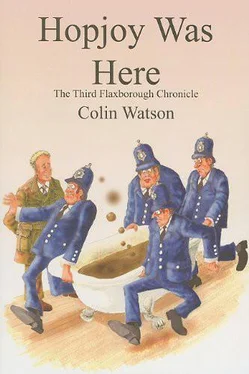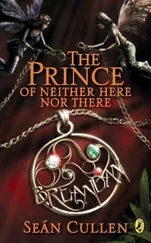“It may be quite unconnected with the case, of course,” ventured Purbright, who was beginning to find Warlock’s forensic rhapsody a trifle wearing.
“Five pounds to a gnat’s navel it has absolutely nothing to do with it, squire. Elimination, though...that’s what counts with us, elimination.” He looked again at his report. “Now then; where were we? Ah, bloodstains...”
There were six sites of staining. The bathroom floor had been spotted. The wall splashes had proved, as expected, positive. Blood accounted for the mark on the razor blade found in the bathroom cabinet. Then there was the hammer head. Finally, careful search had disclosed a few smears on the stair carpet and on the concrete floor of the garage.
The last two had lent themselves admirably to the process of elimination. They were not of human origin. All the others were, and they belonged to the same common ‘O’ group.
“I don’t quite see how the razor blade fits in,” said Purbright. “It’s hardly likely to have been used as a weapon. I mean you don’t fell a bloke with a hammer and then cut his throat: that would be sheer ostentation. Anyway, we should have found more mess, surely?”
Warlock watched him with the secretly gleeful air of a conjuror whose audience falls for diversion while the best part of his trick is in preparation.
“I told you, didn’t I, that this case is absolutely marvellous?” His eyes gleamed. “Now then; what do you think of this?”
Purbright picked up the large photograph that had been slid triumphantly before him.
It appeared to be of a huge, round butcher’s block on to which a handful of canes had been carelessly tossed. The canes were partly embedded in a thick, tarry substance, spread irregularly over the surface of the block. They stuck out, some straight, some curving, at varying angles.
“This one’s been pulled up even farther.” Warlock tossed down a second photograph. The canes had become long, segmented stovepipes, jutting from some sort of dune, coarsely granular in texture. Purbright was reminded of surrealist seashore paintings.
“The hammer head,” announced Warlock.
“Ah, yes.”
Warlock waited. “Of course, you see what’s wrong.”
The inspector held the second enlargement at arm’s length and squinted judiciously. “To be perfectly honest...”
Impatiently, scornfully almost, Warlock leaned over and jabbed his finger at the stovepipes. “No crushing. No skin. No follicles.”
The triple negation sounded like a maximum sentence without possibility of appeal. Purbright nodded meekly. “You’re perfectly right, of course. Not a follicle in sight.”
Warlock sighed and took up a relatively relaxed pose behind Purbright’s chair. He pointed, more gently this time, at the prints.
“You see, squire, it’s reasonable to expect that hairs are going to stick to a hammer when it’s used to bash somebody’s head in. But they get squeezed between two hard surfaces—steel and bone—for a fraction of a second before the skull gives way. So naturally they ought to show damage. These don’t.
“Another thing: the hairs, or some of them, are bound to come out, roots and all. Plus the odd bit of skin, of course. But in this case...well, you can see for yourself.”
Purbright studied the photographs a little longer and said: “Obviously, we’ll have to come back to these. But perhaps you’d like to run over what’s left of the other things first.”
The remainder of the report was straightforward enough. The broken glass unearthed from the garden included large fragments easily identifiable as portions of a commercial acid carboy, whose protective basket of iron strapping had been found in a wardrobe (Purbright loyally forbore from mentioning Love’s encounter with that article). Glass splinters on the second hammer, that left in the garage, clearly indicated its having been used to smash the carboy.
Two sets of fingerprints were recurrent throughout the house. One set corresponded with prints at Periam’s shop. The other, presumably, was Hopjoy’s. There had been found no print belonging to either man which could be considered of special significance in relation to whatever had happened in the bathroom. The surfaces of the hammer shafts, the razor blade, and the pieces of carboy had yielded nothing.
Microscopic examination of hairs taken from combs in Periam’s bedroom and shop and from clothing in a cupboard in his lodger’s room had virtually settled the origin of those on the hammer. They were almost certainly Hopjoy’s.
“There you are, squire. Make what you like of that lot.”
Purbright rubbed his chin reflectively. “You’ve certainly been thorough.”
Warlock beamed. He tossed up an imaginary tennis ball and thwacked it through the window.
“It’s just as well,” said Purbright, “that I didn’t clap Periam in irons this morning. I suppose I couldn’t have been blamed if I had. Yet there was something rather pat about the set-up at that house. It was too much to expect a nice conclusive lab. report...” he tapped the photographs—“...with follicles.”
“Sorry.”
“Those hairs, then, were...”
Warlock winked, turned two fingers into a pair of scissors and snipped off an invisible forelock.
Purbright carried Warlock’s report to the Chief Constable not in confidence that Mr Chubb possessed a superiority of intellect consonant with his rank but rather as a man with a problem will seek out some simple natural scene, the contemplation of which seems to set free part of his mind to delve more effectually towards a solution.
Thus, while he gazed at the gentle, dignified vacuity of Mr Chubb’s face, the inspector mentally weighed and dissected each fact as he passed it on.
Mr Chubb, as usual, was leaning elegantly against his fireplace. He seemed never to sit down except at home, and then almost exclusively at meal times. “Harcourt,” his wife once averred, “even watches television standing up; I think his mother must have been frightened by Edward the Seventh.”
The Chief Constable gave a delicate, dry cough. “Do I understand, Mr Purbright, that you feel an arrest would be unwise at this stage?”
“Ah, I thought that might be your reaction, sir. It’s this queer business of the hammer that’s spoiling everything.”
“It strikes me,” said Mr Chubb, “as a singularly unnecessary complication. Do we really have to take Warlock’s word that the thing was deliberately contrived?”
“I’m afraid we do. And the case won’t hang together until we can explain why the murderer went to that particular piece of trouble. He’d prepared to dispose of the corpse; the logical thing was to erase all other signs of the crime—wash away bloodstains, burn the ligature or bury the knife or get rid of the gun, wipe off fingerprints, and so on. But no, he actually manufactured some evidence of violence by cutting off a few of the victim’s hairs and sticking them on a hammer head with a dab of his blood. You notice the choice of hiding place, incidentally—under the bath—accessible to methodical searchers, yet just not obvious enough to arouse suspicion of a deliberate plant.”
“I hate to see subtlety showing through these affairs, Mr Purbright. Murder is such a beastly business in the first place. It becomes positively crawly when you have to strain a decent intelligence to sort it out. And nowadays, I’m afraid, the better the address the more distasteful the crime turns out to be. Odd, that, isn’t it?”
“You’re thinking of Beatrice Avenue, of course...”
“Well, it is quite a nice road. I remember old Abbott and his sister used to live in that place with a yellow gate, up at the park end.” He paused, frowning. “You know, this is going to drop the values a bit.”
Читать дальше

![Fredrik Backman - Britt-Marie Was Here [Britt-Marie var här]](/books/61260/fredrik-backman-britt-marie-was-here-britt-thumb.webp)










